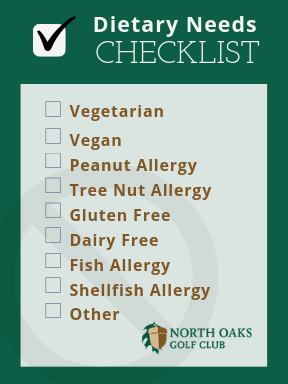 Whether you're hosting a large corporate meeting, gala, or wedding, chances are some of your guests have specific dietary needs. Some may simply be vegetarian, but others may be diabetic, lactose intolerant, have celiac disease, a nut allergy, soy allergy, etc. Of course, you don't want to exclude these guests, so what are some ways to accommodate these individuals without it becoming an issue? And, in the case of weddings, how do you address such needs on your invitation?
Whether you're hosting a large corporate meeting, gala, or wedding, chances are some of your guests have specific dietary needs. Some may simply be vegetarian, but others may be diabetic, lactose intolerant, have celiac disease, a nut allergy, soy allergy, etc. Of course, you don't want to exclude these guests, so what are some ways to accommodate these individuals without it becoming an issue? And, in the case of weddings, how do you address such needs on your invitation?
Here are six graceful ways to accommodate your guests' dietary needs.
Ask for Guests' Dietary Needs
No matter what you're hosting, it's important to ask your guests to identify if they have a specific dietary need. We recommend providing a list with boxes your guests can check instead of asking an open-ended question. This can be done on your physical invites (this is how to identify dietary needs for a wedding reception) or via email if it's a more informal event. Of course, you can't make an exhaustive list of possible dietary needs on the back of your wedding invites, but you want to make sure to include the most common. Include an "other" option with space to write a unique dietary need if necessary.
It's important that you take these dietary needs very seriously. We realize an employee or guest could identify that they have a nut allergy just because they don't like almonds and cashews, but that doesn't mean you should include nuts in your menu. It's better to be cautious, so treat every dietary need as if it were an allergy.
Provide That Information to Your Caterer As Soon As Possible
Your caterer won't be preparing the event's menu until the day of, but together, you will be planning the menu far in advance. Be sure to communicate guests' dietary needs as soon as the information becomes available. This will help you and your caterer create a delicious menu that everyone can enjoy, worry-free.
If you're unable to create one main course for everyone, it's OK to ask your caterer to prepare two or three main courses. It will likely cost more, but your guests will be grateful for your efforts.
Know the Ingredients Included in Your Menu Items
Although guests identified their dietary needs when they RSVP'd or registered for your event, they may still have questions when it comes time to eat. "Are there nuts in the salad?" "Does this dessert contain dairy?" "Is the main course gluten free?" Your serving staff should be well equipped to answer any questions your guests ask or understand the importance of checking with the chef before guessing at the answer.
This may be just as important for you as it is the serving staff. So, ask your caterer to provide a list of all ingredients included in your menu items. Keep a copy on hand so you're sure to provide accurate answers to guests' questions.
Label Meals
This can be done one of two ways. If your event includes a plated dinner, create meal cards that identify which guest is eating which meal. This way, your client who is allergic to nuts won't receive the chicken almondine (although you likely wouldn't include that in your menu if there were an allergy to nuts).
If your meal is served buffet style, it is especially important to clearly label each item on the table. You may want to go as far as including a note that says "includes dairy" to avoid those who are lactose intolerant from dishing up the wrong item.
Use a Disclaimer If Necessary
Not all catering kitchens are gluten- or allergy-free. If this is the case, find a legal expert who can draft a liability statement that explains your caterers take precautionary measures to create meals for those with dietary needs in a safe way, without cross-contamination, but they cannot guarantee that a meal did not come in contact with gluten, nuts, soy, etc.
Always Have a Backup Plan
Out of everyone at your event, at least one person will forget to inform you of their dietary needs ahead of time. It's inevitable. And they'll make a special request on the fly. This is where your backup plan saves you. If your caterer is preparing plated dinners, make sure to order a few extra plates of everything. If you don't have what they need for the main course, perhaps you can offer a larger salad rather than the small starter salad. This will require you to think on your toes, but if you're prepared with additional meals or non-dairy desserts, for example, you have nothing to worry about.
It may sound like a lot of work, but the key is starting early. The sooner you understand your guests' dietary needs, the sooner you can start planning your menu and the more prepared you'll be to cater to everyone.







